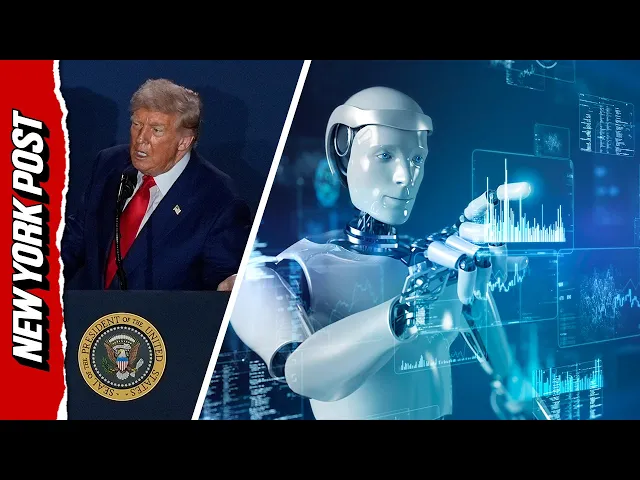Trump: ‘America is going to win’ the AI race

Trump's big AI promises: what we should know
The intersection of politics and technology has never been more pronounced, with artificial intelligence emerging as a focal point in national discourse. In a recent interview, former President Donald Trump outlined his vision for American leadership in the artificial intelligence revolution, declaring with characteristic confidence that "America is going to win" the global AI race. This bold assertion comes amid increasing competition from China and other nations investing heavily in AI capabilities.
Key Points
- Trump positions AI leadership as a matter of national security and economic sovereignty, emphasizing that America cannot allow other countries to dominate this critical technology
- He expresses concern about AI's potential to replace human jobs while simultaneously suggesting it will create new opportunities and industries
- The former president advocates for government investment in AI research and development, particularly in areas with national security implications
- Trump mentions the need for regulatory frameworks that don't stifle innovation while also protecting American interests
The Sovereignty Imperative
The most compelling aspect of Trump's AI commentary isn't his optimism about American victory but rather his framing of AI as a sovereignty issue. "We have no choice," he emphasizes repeatedly—positioning AI leadership not as optional but as existential for American economic and military dominance. This perspective transcends typical partisan technology policy and touches on deeper questions about America's place in a rapidly evolving global landscape.
This sovereignty-focused framework matters because it signals a potential shift in how political leaders discuss technology. Rather than debating the virtues of regulation versus innovation in isolation, the conversation is evolving toward seeing technological leadership as fundamental to national security. We're witnessing the tech sector being increasingly viewed through a geopolitical lens, which could significantly impact how policies are crafted and implemented.
What's Missing From This Picture
While Trump's bullish stance on American AI capabilities projects confidence, it overlooks several critical realities of the current AI landscape. For one, America faces significant challenges in semiconductor manufacturing—the hardware foundation upon which AI systems run. Taiwan's TSMC currently dominates advanced chip production, with China investing hundreds of billions to develop domestic capabilities. Any serious national AI strategy would need to address this hardware dependency.
The former president's comments also lack specificity on talent development. The global competition for AI researchers and engineers has intensified dramatically, with American universities and companies facing increasing difficulty retaining top talent due to immigration restrictions and competitive offers
Recent Videos
How To Earn MONEY With Images (No Bullsh*t)
Smart earnings from your image collection In today's digital economy, passive income streams have become increasingly accessible to creators with various skill sets. A recent YouTube video cuts through the hype to explore legitimate ways photographers, designers, and even casual smartphone users can monetize their image collections. The strategies outlined don't rely on unrealistic promises or complicated schemes—instead, they focus on established marketplaces with proven revenue potential for image creators. Key Points Stock photography platforms like Shutterstock, Adobe Stock, and Getty Images remain viable income sources when you understand their specific requirements and optimize your submissions accordingly. Specialized marketplaces focusing...
Oct 3, 2025New SHAPE SHIFTING AI Robot Is Freaking People Out
Liquid robots will change everything In the quiet labs of Carnegie Mellon University, scientists have created something that feels plucked from science fiction—a magnetic slime robot that can transform between liquid and solid states, slipping through tight spaces before reassembling on the other side. This technology, showcased in a recent YouTube video, represents a significant leap beyond traditional robotics into a realm where machines mimic not just animal movements, but their fundamental physical properties. While the internet might be buzzing with dystopian concerns about "shape-shifting terminators," the reality offers far more promising applications that could revolutionize medicine, rescue operations, and...
Oct 3, 2025How To Do Homeless AI Tiktok Trend (Tiktok Homeless AI Tutorial)
AI homeless trend raises ethical concerns In an era where social media trends evolve faster than we can comprehend them, TikTok's "homeless AI" trend has sparked both creative engagement and serious ethical questions. The trend, which involves using AI to transform ordinary photos into images depicting homelessness, has rapidly gained traction across the platform, with creators eagerly jumping on board to showcase their digital transformations. While the technical process is relatively straightforward, the implications of digitally "becoming homeless" for entertainment deserve careful consideration. The video tutorial provides a step-by-step guide on creating these AI-generated images, explaining how users can transform...
